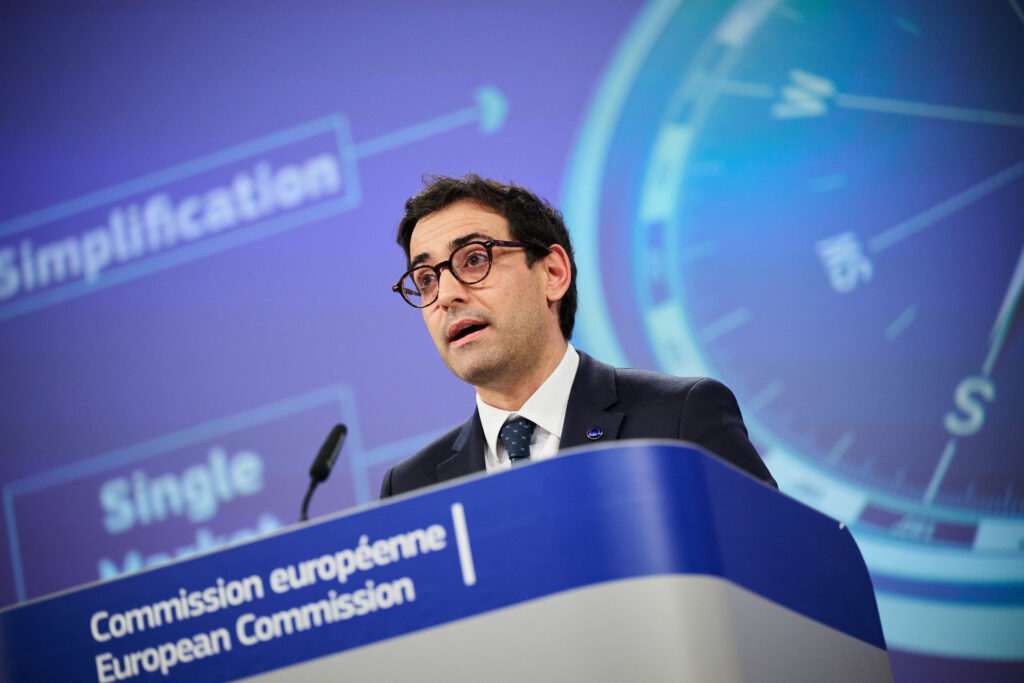Brussels – It will be the EU’s “North Star” for the next five years, which appear to be somewhat different from the previous five years, those of the Green Deal. The Competitiveness Compass presented today by the European Commission contains a long wish list to make the Old Continent competitive again and not lose the global challenge against China and the United States.
The New Economic Doctrine
During this morning’s (Jan. 29) press conference at the Berlaymont, at which she presented the Competitiveness Compass, EU executive chairwoman Ursula von der Leyen stressed that “Europe has what it takes to succeed in the race to the top” of the world economy but that “we need to correct our weaknesses to regain competitiveness.”
She was echoed by Executive Vice-President for Prosperity and Industrial Strategy Stéphane Séjourné, who says that the one published today is the “economic doctrine for the next five years,” a simple doctrine that “can be summed up in one keyword: competitiveness.” We are facing,” he says, “a change of mindset for Europe and Europeans,” by which Brussels aims to make the Union “more predictable while maintaining the course of our European model: decarbonised, social, and respectful of our values.”
It is time to restart Europe’s innovation engine.
We have the Compass.
We have the political will.
Now, what matters is speed and unity.
Because the world is not waiting for us ↓ https://t.co/4iollrSWxi
– Ursula von der Leyen (@vonderleyen) January 29, 2025
Yes, because they both promised from the stage in front of reporters that the Green Deal’s goals would remain in place. The reassurances are addressed primarily to those who have shown distrust of the so-called “Omnibus” measures, which are amendments (potentially even controversial ones) to existing EU legislation that will be put together in large packages, as happens in Italy.
The widespread fear is that they want to get their hands precisely on the complex “green” regulations laboriously passed during von der Leyen’s first term, against which businesses, companies, and a growing part of European politics are turning. The goals remain, and both von der Leyen and Séjourné have repeated them, but a discussion will now open on the path to achieving them under the banner of two more magic words: flexibility and pragmatism.
The three basic pillars
To align with the former ECB number one’s recommendations, the Compass is structured around three main “pillars”: closing the innovation gap, moving decarbonisation and competitiveness forward at the same pace (possibly a quick pace), and, finally, reducing foreign dependencies and increasing the Union’s security. Between now and the end of 2026, the Commission envisions some twenty legislative proposals to put the EU in a position to deal with the future (which, indeed, is the present) of global competition.
It starts, in the field of innovation, with the AI gigafactories and Apply AI initiatives to drive the development and industrial adoption of artificial intelligence in the most strategic sectors, which will include action plans for advanced materials and quantum technologies, biotechnology, robotics, and space, which will be complemented by a strategy for start-ups and the development of a so-called 28th legal regime to simplify regulations affecting companies, which are currently fragmented among 27 national legislations.

Concerning decarbonisation, the Clean Industrial Deal will set out a competitiveness-based approach, while the Affordable Energy Action Plan will control energy costs. The Industrial Decarbonisation Accelerator Act will extend and facilitate permits to sectors in transition, joining other action plans tailored to other energy-intensive sectors.
The last pillar, reducing dependencies and increasing security, involves “effective partnerships” focusing on trade agreements and clean investments to ensure a reliable supply of raw materials, clean energy and technologies, and sustainable fuels. This should also include the introduction of a “European preference” with the revision of public procurement rules.
The five transversal imperatives
Now, to put these priorities into action, the Commission has identified five horizontal “enablers” to inform its legislative proposals, which can be summarised as the following imperatives: simplify, eliminate barriers congenital in the domestic market, finance competitiveness, promote the skills of the future, and make coordination between the EU and national levels more effective.
Simplification is, after all, the mantra resonating in Brussels—especially among circles most intolerant of the Green Deal and EU bureaucratic hypertrophy—already since the last part of the previous European legislature (2019-2024). Thus, the Commission now aims to significantly reduce sustainability reporting requirements on companies, including those related to due diligence and taxonomy. Calculator in hand, experts from the EU executive estimate at around €37.5 billion the savings which should come to companies on the Old Continent from the elimination of administrative burdens deemed excessive, which should find implementation in the very Omnibus measure (or various such measures) mentioned earlier.

As for the removal of barriers in the single market, which goes hand in hand with the issue of financing, the Commission has in the pipeline a horizontal strategy and, above all, the construction of a Savings and Investment Union—which is nothing more than the Capital Markets Union that has been talked about for years and has never seen the light of day—to create new European financial products and transport on this side of the Atlantic the private savings and investments that to date flow instead to the U.S. What is clear, however, is that the EU executive wants to mobilise private capital alongside public investment because, it argues, the latter alone will not be sufficient to finance EU priorities.
In addition, von der Leyen intends to promote skills and quality jobs to stimulate the European economy and make it “future-proof.” Finally, better policy coordination between Brussels and the Twenty-seven is to be achieved. To this end, a competitiveness coordination instrument will be established, whose role will be to ensure national implementation of community policy objectives, identify projects of common interest involving several member states, and manage their funding.
To support the implementation of the measures of this instrument, the Commission wants to introduce in the next Multiannual Financial Framework (MFF)—which will cover the seven years 2028–2034 and which, it seems, will see some big news compared to previous programming periods—a Competitiveness Fund that should replace several financial instruments that are already active in these areas which, Berlaymont technicians explain, are not only confusing but also difficult to activate. However, more than new resources, it will mainly be a matter of remodulating those that the chancelleries already pay to the common budget. However, von der Leyen assures that negotiations for the next MFF (which should begin in the second half of this year) should also consider introducing new resources.
English version by the Translation Service of Withub
![[foto: imagoeconomica, rielaborazione Eunews]](https://www.eunews.it/wp-content/uploads/2025/01/stop-burocrazia-350x250.png)




